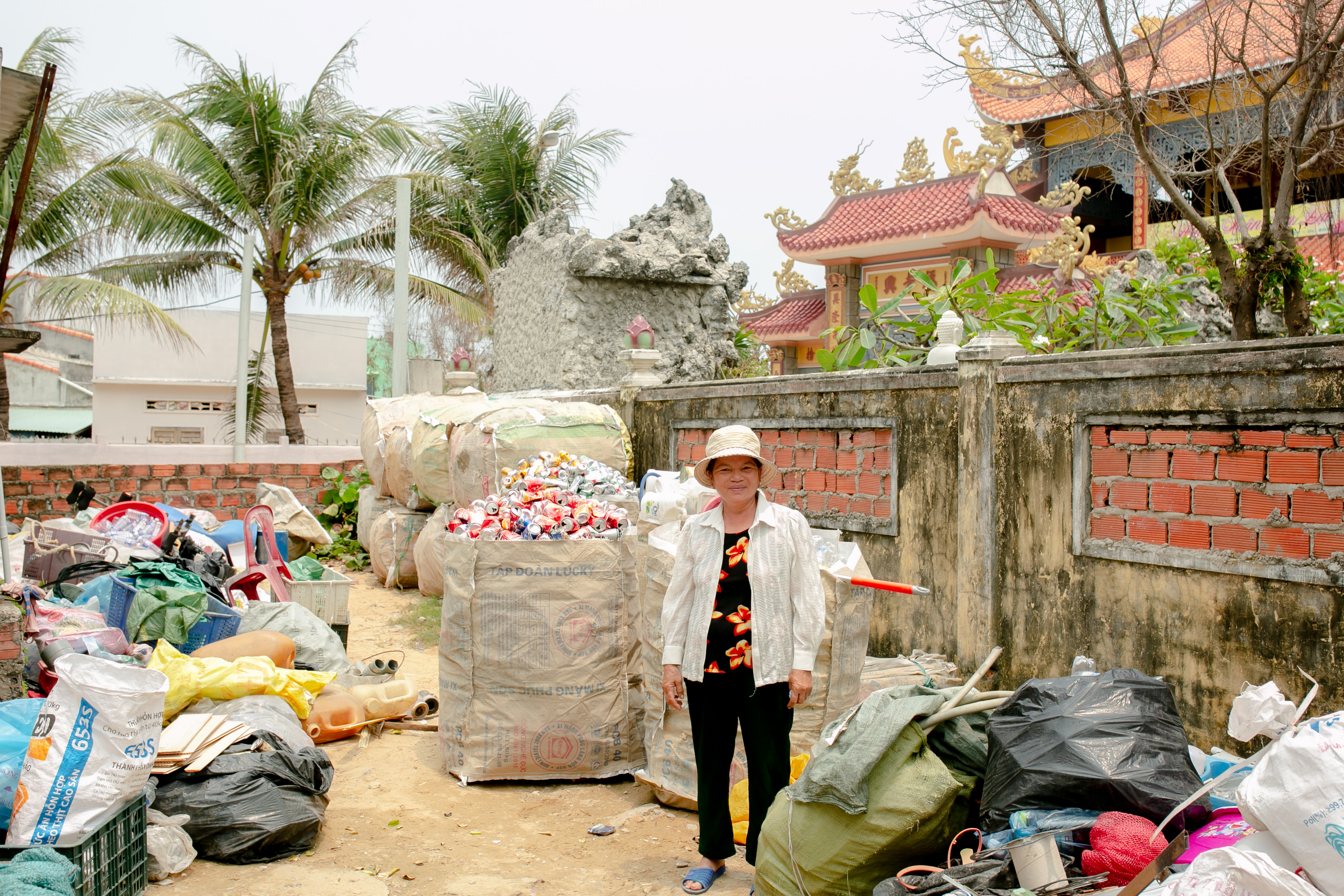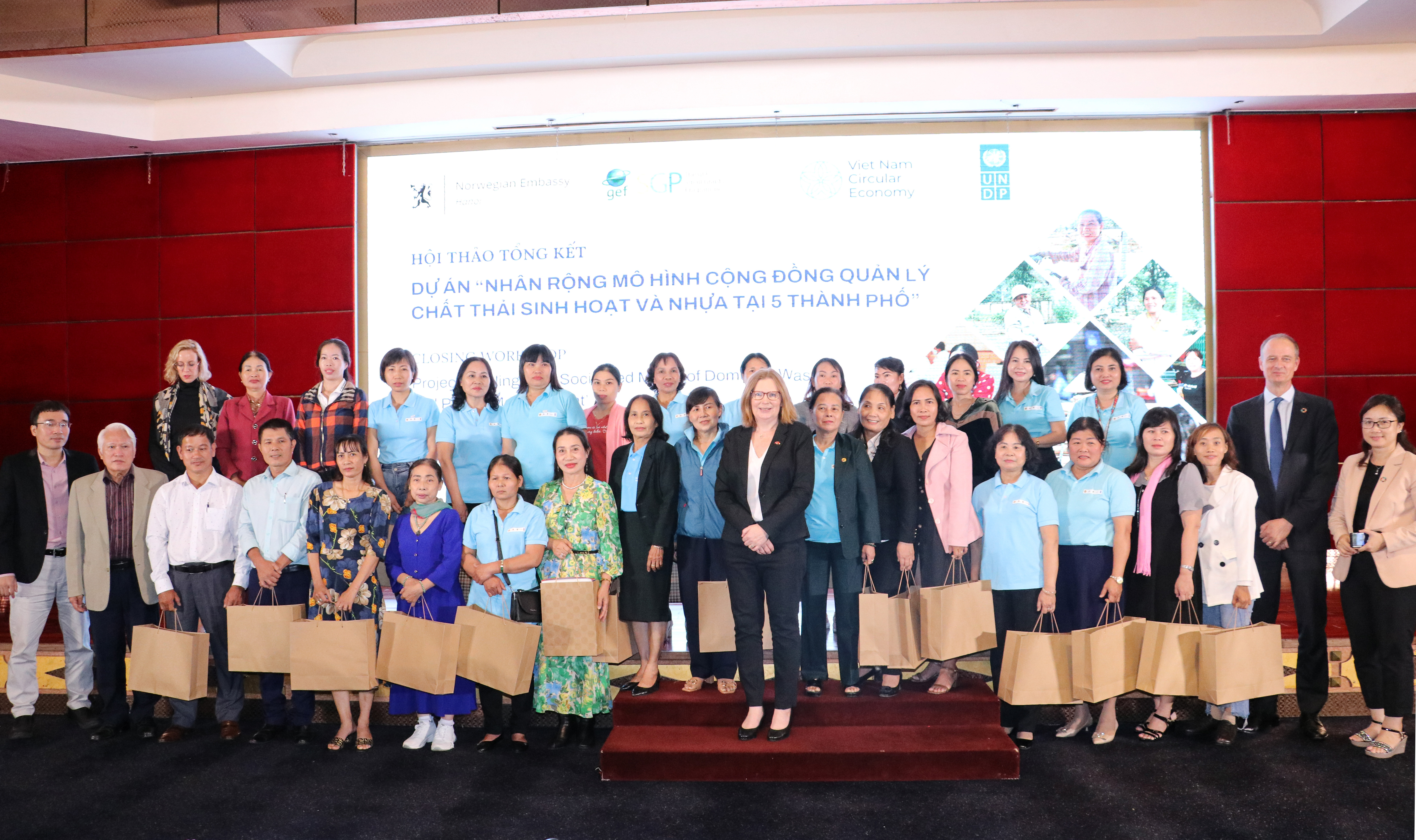Closure of the project “Scaling up a socialised model of waste management in five cities”
November 24, 2022

Ha Noi, 25 November 2022 – The United Nations Development Programme (UNDP) and the Norwegian Embassy in Ha Noi organized the closing workshop of the project entitled "Scaling Up a Socialised Model of Waste Management in Five Cities."
The event shared the results and lessons learned from the project’s work in five Vietnamese cities. Participants also discussed the sustainability of the project's accomplishments, the expansion of its achievements, and the development of follow-up plans. Representatives from the Ministry of Environment and Natural Resources, UNDP, the Norwegian Embassy, provincial authorities, Provincial Women's Unions, the Farmer’s Union, experts, and female informal waste workers from the five cities were in attendance.
This project aimed to develop integrated local models of domestic waste and plastic management in five sites in Da Nang City and the provinces of Quang Ninh, Binh Dinh, Binh Thuan, and Binh Duong. It cooperated with local organizations such as the Farmer's Union and Women's Unions to increase waste segregation, collection, recycling, and composting, as well as to accelerate secondary material markets. It also collaborated with enterprises to promote the circular economy by improving policy and stakeholder engagement.
Despite the outbreak of the Covid-19 pandemic and the travel restrictions associated with the lockdown, the project achieved many key results throughout its three years of implementation. Effective small-scale models of domestic waste management were developed in each of the five cities. Citizen awareness and stakeholder participation in reducing single-use plastic and enhancing waste management increased by 40 percent. Over 100 corporate regulations on the sustainable production and consumption of materials have been adopted. Over 100 tourist boats in Ha Long Bay, Quang Ninh province, have firmly committed to stop using single-use plastics. A nationwide Viet Nam Circular Economy Hub was co-designed and implemented by UNDP and the Institute of Strategy and Policy on Natural Resources and Environment (ISPONRE). Lastly, the institutional capacity of local authorities and stakeholders was enhanced through the introduction of the circular economy approach.
"Waste workers, especially those in the informal sector, play a vital role in waste management systems and advancing a circular economy. They are vulnerable and exposed to several risks, such as when they collect and treat hazardous materials and medical waste. Therefore, it is essential that waste workers are not only protected, supported, and trained, but also consulted and included by the municipalities when they redesign and enhance their waste management systems. Our support resulted in the delivery of over 42 training courses to more than 1,800 informal waste workers, mainly women, and the establishment of five revolving funds, all of which resulted in an increase in the income of waste workers by at least 20 percent compared to the baseline prior to the project," said Mr. Patrick Haverman, UNDP Deputy Resident Representative in Viet Nam.
Mr. Haverman also shared that UNDP has recently launched a new initiative in Quy Nhon building on the lessons learned from this project. "The upcoming Material Recovery Facility will include and enhance the roles and contributions of informal waste workers along the plastic and waste value chains, and will also pilot waste management models in the fishery sector with a view to delivering bigger results and the strengthened resilience of informal waste workers."
“Norway welcomes and appreciates the strong political commitment by the Vietnamese Government to tackle the issue of waste management and marine plastics. In addition to projects like the five cities program, we need a global agreement with global rules to stem the flow of plastic pollution. Based on the decision at the United Nations Environment Assembly in March this year, there is a window of opportunity to develop an effective plastic treaty by the end of 2024. We need to establish common global rules that will restrain plastic demand to sustainable levels, enable a circular economy for plastics that protects the environment and human health, and stop the leakage of plastics into nature,” said Ms. Mette Møglestue, Deputy Head of Mission at the Norwegian Embassy in Ha Noi.
For more information, please kindly contact:
Phan Huong Giang
UNDP Media and Communications Analyst, Climate Change and Environment
Email: phan.huong.giang@undp.org
Mob: 0948466688
Nguyen Thi Kim Thanh
Information and Communication Adviser, Norwegian Embassy in Ha Noi
Email: Thi.kim.thanh.nguyen@mfa.no
Mobile: 0904637298


 Locations
Locations



